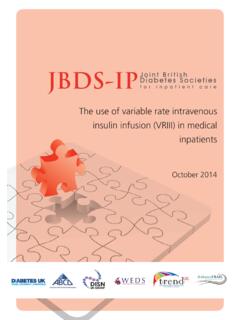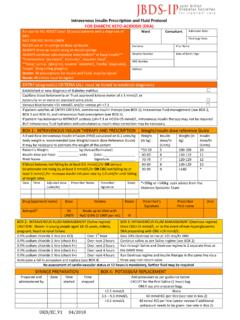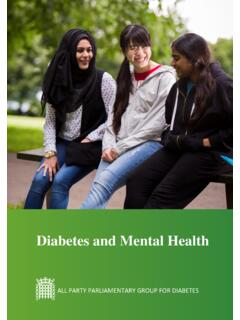Transcription of Good clinical practice guidelines for care ... - Diabetes UK
1 good clinical practice guidelines for care home residents with Diabetes A revision document prepared by a Task and Finish Group of Diabetes UK. good clinical practice guidelines for care home residents with Diabetes A revision document prepared by a Task and Finish Group of Diabetes UK. formerly guidelines of practice for Residents with Diabetes in care Homes, a report of the British Diabetic Association (1999). January 2010 . Foreword Foreword A decade on from the original British Diabetic Association (BDA) report, we have seen several important initiatives in Diabetes care in the united kingdom such as the National Service Framework for Diabetes , various evidence-based Diabetes guidelines from the National Institute of Health and clinical Excellence (NICE), and the inclusion of Diabetes care items in the Quality Outcomes Framework (QOF) in primary care . While there is worthwhile evidence that these approaches have resulted in a greater emphasis on integrated Diabetes care with a focus on community-based and primary care working, there has been relatively little progress in enhancing high quality Diabetes care within residential settings.
2 We hope that these good clinical practice guidelines will bring about a renewed interest in this often neglected clinical area and lead to greater recognition of the important issues affecting this group of care home residents. Improving Diabetes care in residential and nursing homes is a major goal but unless there is a commitment by all healthcare professionals involved in Diabetes care supported by social services, NHS and independent care home staff, the Department of Health, and other interested agencies, these recommendations are unlikely to have a positive influence. Diabetes mellitus is one of several chronic disabling disorders such as dementia which are increasing in prevalence and are likely to require greater provision for formal long-term care . These guidelines highlight areas of special need for residents with Diabetes in care homes and we hope that by their wide and effective implementation, the ultimate wellbeing and quality of life sustained by residents will be enhanced.
3 Professor Alan Sinclair MSc MD FRCP. Working Group Chair good clinical practice guidelines for care home residents with Diabetes iii Acknowledgments Acknowledgments We would like to thank all those members of the original BDA Working Party who helped to produce the 1999 report. This revision document forms part of a series of initiatives by Diabetes UK to enhance Diabetes care within residential care settings. We wish to take this opportunity to thank staff at Diabetes UK Bridget Turner, Cathy Moulton, David Bryant, Zo Harrison, Florence Brown and the Publishing and Digital Media teams for ensuring that this project was prioritised and supported and members of the Diabetes UK Task and Finish Group on older patients in residential care . We would also like to thank the following colleagues at the Royal College of Nursing for their contribution: Margaret Stubbs, Gayle Richards, Jill Hill, Margaret Bannister, Keith Booles, Patricia Clawson.
4 Members of the Working Group Professor Alan Sinclair (Chair) Dr Terry Aspray Professor of Medicine and Consultant Consultant Physician in Diabetes Sunderland Royal Hospital Institute of Diabetes for Older People (IDOP) Paul Frisby Bedfordshire & Hertfordshire Postgraduate General Practitioner Medical School Arlington Road Medical practice Dr Susan Benbow Eastbourne Consultant Diabetologist Haydn Mayo Walton Hospital General Practitioner Liverpool North Cardiff Medical Centre Professor Roger Gadsby Nicky Middleton General Practitioner and Associate DSN. clinical Professor Oxfordshire PCT. Institute of clinical Education Yvonne Gosset University of Warwick Local Area Manager (SE). Roisin Wright care Quality Commission clinical Lead - Diabetes Education Professor Jonathan Richards NHS Cambridgeshire Professor of Primary care Sue Thomas University of Glamorgan School Nursing Policy & practice Adviser of care Sciences Royal College of Nursing Fiona Kirkland Consultant Nurse for Diabetes South Staffordshire Primary care Trust good clinical practice guidelines for care home residents with Diabetes v Contents Contents Executive summary 1.
5 Introduction 5. Aims of the guidelines 7. Background to the problem 9. Recent evidence to support good clinical practice guidance 12. Identification of gaps in the provision of Diabetes care in care homes: a UK perspective 16. Aims of care for residents with Diabetes in residential and nursing homes: broad principles 18. Barriers to effective Diabetes care 20. Definitions and legislative framework for the review of care within care homes 22. Screening for Diabetes and its complications at admission to a care home 24. Dietary requirements for residents with Diabetes in care homes 27. Provision of effective Diabetes care for residents with mental health needs 33. Meeting the needs of Diabetes care for residents from ethnic minorities 36. Effective glucose control in care homes 37. Recognition and management of hypoglycaemia within care homes 42. Roles of other key healthcare professions: provision of Diabetes care for residents of care homes 44.
6 Role of the Diabetes specialist nurse (DSN) 47. Role of the practice nurse 48. Community nurse (district nurse) provision of Diabetes care within care homes 49. Foot care and provision of podiatry services for resident with Diabetes in care homes 51. Access to opthalmological services for residents of care homes 53. vi good clinical practice guidelines for care home residents with Diabetes Contents Assessment and treatment of pain in residential settings 56. care planning: residents with Diabetes in care homes 58. Diabetes annual review arrangements 60. Use of robust outcome measures to assess the efficacy and efficiency of Diabetes care within care homes 61. Education and training requirements for staff within care homes 63. Ethical considerations in providing Diabetes care to residents in care homes 66. End of life care (EoLC) for residents with Diabetes in care homes 67. Primary recommendations which sustain effective Diabetes care within care homes 69.
7 Conclusions 74. Appendix 1: References 75. Appendix 2: An Insulin delegation scheme for care homes 80. Appendix 3: List of educational and training resources 91. Appendix 4: Resident's Diabetes passport 96. Appendix 5: A Diabetes care policy for UK care homes a template 100. Appendix 6: A Diabetes audit tool for care homes (expected October 2010 ) 111. good clinical practice guidelines for care home residents with Diabetes vii Executive summary Executive summary Key messages Recommendations provided are based on published evidence and interpretation by a multidisciplinary group of Diabetes experts. These guidelines are designed to represent a national policy of good clinical practice for Diabetes care within care homes. This document should provide a framework of assessment of the quality of Diabetes care within care homes for use by regulatory bodies who have responsibility for this provision. This document is primarily based on recommendations for adults living within British care home environments and its focus, by virtue of the nature and characteristics of residents, is on older adults.
8 Improvements in Diabetes care within residential and nursing homes are likely to follow a sustained commitment by health and social care professionals to ensure that the wellbeing of residents with Diabetes is paramount, that high quality policies of Diabetes care are implemented and monitored, and effective Diabetes education is an a mandatory and integral part of care home staff training. A care home resident with Diabetes has an increased likelihood of frailty and multiple co-morbidities, and of being part of system associated with unstructured Diabetes care , lack of clear boundaries of clinical responsibility, and an unwillingness, which is sometimes misguided, by many healthcare professionals to intervene actively in goal attainment and enhancing Diabetes care . This has placed an unquantified but heavy health and economic burden on our society. These guidelines summarise the evidence base of published studies in the area, and reviews documents and other material relevant to care within residential and nursing homes.
9 In addition, this document embodies the views and comments of a multidisciplinary expert panel established as the original Working Party to deliver a series of recommendations relating to the provision and delivery of Diabetes care practices primarily for adults within care settings in the UK. The principal features of these good clinical practice guidelines are as follows: residents with Diabetes within institutional settings appear to be a highly vulnerable and neglected group of subjects, and are characterised by a high prevalence of macrovascular complications, tremendous susceptibility to infections, increased hospitalisation rates compared with ambulatory patients with Diabetes , and high levels of physical and cognitive disability the prevalence of known Diabetes within residential and nursing homes in England has been estimated to be as high as 26 per cent. good clinical practice guidelines for care home residents with Diabetes 1.
10 Executive summary numerous deficiencies in providing Diabetes care within care homes exist and include lack of care planning and case management, inadequate dietary (nutritional) guidance, lack of specialist health professional input, and the presence of inadequate and unstructured medical follow-up practices the broad aims for residents with Diabetes in care homes can be summarised as follows: a) to maintain the highest degree of quality of life and wellbeing without subjecting residents to unnecessary and inappropriate medical and therapeutic interventions b) to provide sufficient support and opportunity to enable residents to manage their own Diabetes where this is a feasible and worthwhile option c) to ensure that residents with Diabetes have individualised Diabetes care and that follow-up specialist care is easily available depending on clinical need. Several important barriers to providing improved Diabetes care within long-term care homes exist and include a lack of sufficient training in basic Diabetes care among care home staff combined with inadequate resources to deliver this training and education, poor communication between staff due to lack of distinct professional boundaries and responsibilities, and a lack of national standards of Diabetes care with care homes.










